Ritam Guha
Off-Policy Evaluation and Counterfactual Methods in Dynamic Auction Environments
Jan 09, 2025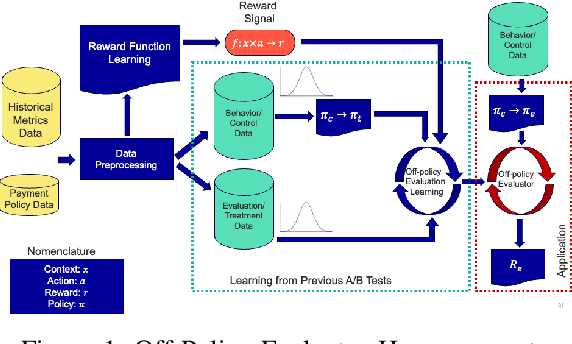
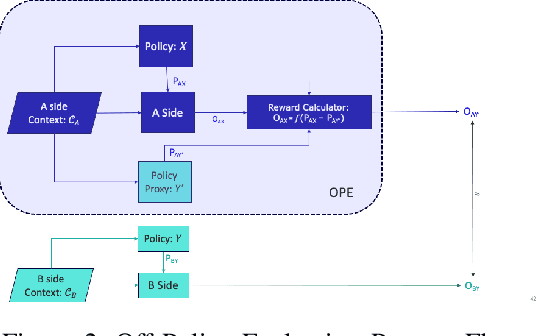
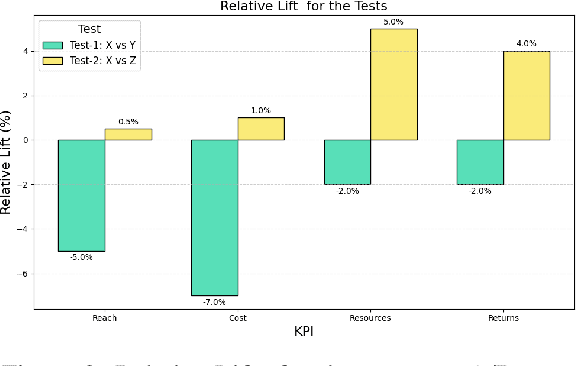
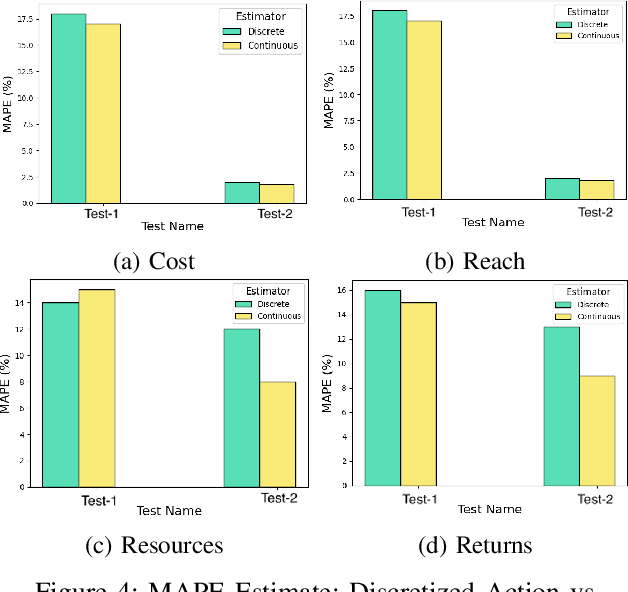
Abstract:Counterfactual estimators are critical for learning and refining policies using logged data, a process known as Off-Policy Evaluation (OPE). OPE allows researchers to assess new policies without costly experiments, speeding up the evaluation process. Online experimental methods, such as A/B tests, are effective but often slow, thus delaying the policy selection and optimization process. In this work, we explore the application of OPE methods in the context of resource allocation in dynamic auction environments. Given the competitive nature of environments where rapid decision-making is crucial for gaining a competitive edge, the ability to quickly and accurately assess algorithmic performance is essential. By utilizing counterfactual estimators as a preliminary step before conducting A/B tests, we aim to streamline the evaluation process, reduce the time and resources required for experimentation, and enhance confidence in the chosen policies. Our investigation focuses on the feasibility and effectiveness of using these estimators to predict the outcomes of potential resource allocation strategies, evaluate their performance, and facilitate more informed decision-making in policy selection. Motivated by the outcomes of our initial study, we envision an advanced analytics system designed to seamlessly and dynamically assess new resource allocation strategies and policies.
Discovering Adaptable Symbolic Algorithms from Scratch
Jul 31, 2023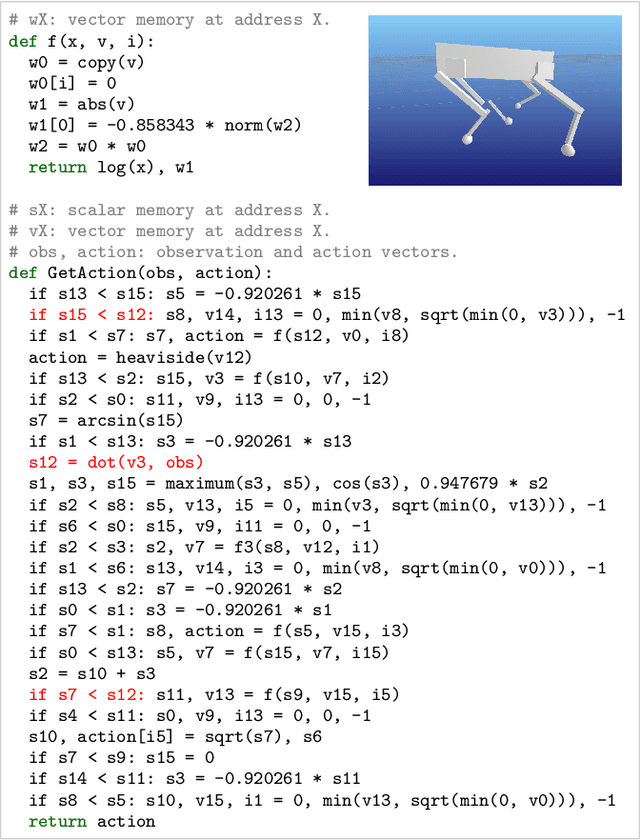
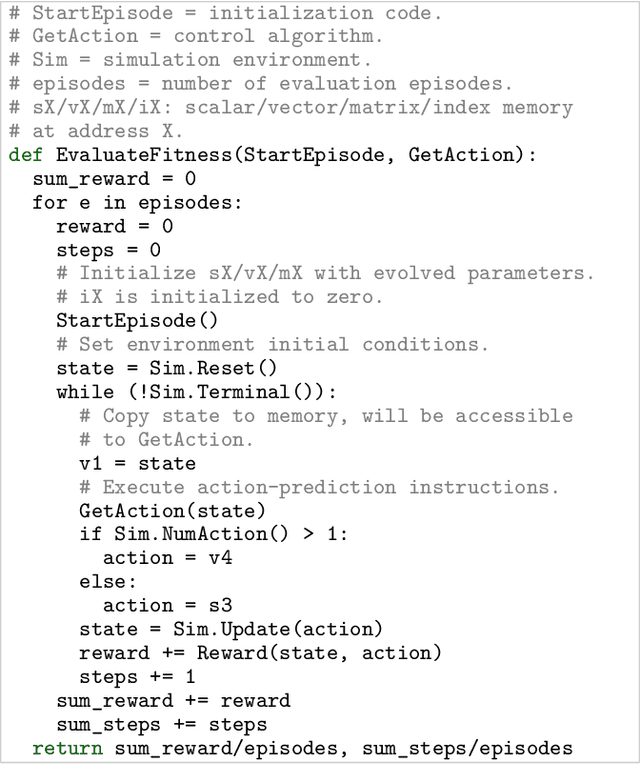
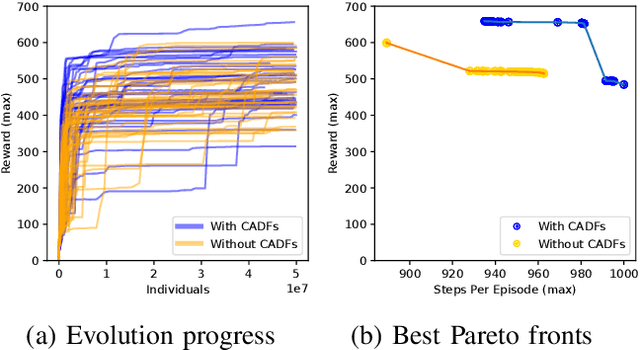

Abstract:Autonomous robots deployed in the real world will need control policies that rapidly adapt to environmental changes. To this end, we propose AutoRobotics-Zero (ARZ), a method based on AutoML-Zero that discovers zero-shot adaptable policies from scratch. In contrast to neural network adaption policies, where only model parameters are optimized, ARZ can build control algorithms with the full expressive power of a linear register machine. We evolve modular policies that tune their model parameters and alter their inference algorithm on-the-fly to adapt to sudden environmental changes. We demonstrate our method on a realistic simulated quadruped robot, for which we evolve safe control policies that avoid falling when individual limbs suddenly break. This is a challenging task in which two popular neural network baselines fail. Finally, we conduct a detailed analysis of our method on a novel and challenging non-stationary control task dubbed Cataclysmic Cartpole. Results confirm our findings that ARZ is significantly more robust to sudden environmental changes and can build simple, interpretable control policies.
Atom Search Optimization with Simulated Annealing -- a Hybrid Metaheuristic Approach for Feature Selection
May 10, 2020



Abstract:'Hybrid meta-heuristics' is one of the most interesting recent trends in the field of optimization and feature selection (FS). In this paper, we have proposed a binary variant of Atom Search Optimization (ASO) and its hybrid with Simulated Annealing called ASO-SA techniques for FS. In order to map the real values used by ASO to the binary domain of FS, we have used two different transfer functions: S-shaped and V-shaped. We have hybridized this technique with a local search technique called, SA We have applied the proposed feature selection methods on 25 datasets from 4 different categories: UCI, Handwritten digit recognition, Text, non-text separation, and Facial emotion recognition. We have used 3 different classifiers (K-Nearest Neighbor, Multi-Layer Perceptron and Random Forest) for evaluating the strength of the selected featured by the binary ASO, ASO-SA and compared the results with some recent wrapper-based algorithms. The experimental results confirm the superiority of the proposed method both in terms of classification accuracy and number of selected features.
Fuzzy Mutation Embedded Hybrids of Gravitational Search and Particle Swarm Optimization Methods for Engineering Design Problems
May 10, 2020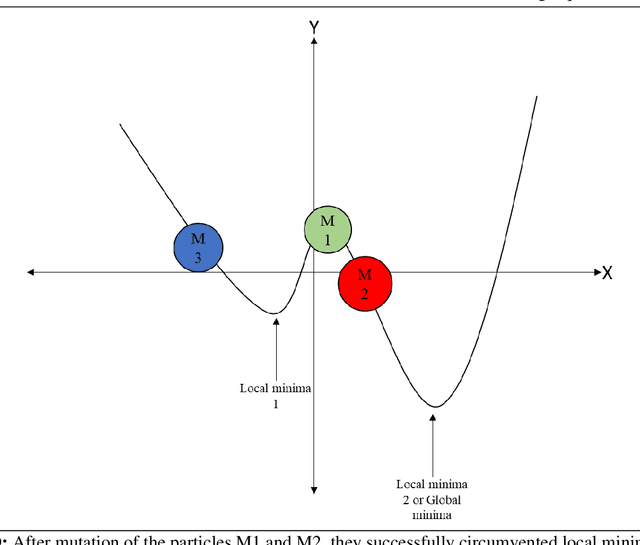



Abstract:Gravitational Search Algorithm (GSA) and Particle Swarm Optimization (PSO) are nature-inspired, swarm-based optimization algorithms respectively. Though they have been widely used for single-objective optimization since their inception, they suffer from premature convergence. Even though the hybrids of GSA and PSO perform much better, the problem remains. Hence, to solve this issue we have proposed a fuzzy mutation model for two hybrid versions of PSO and GSA - Gravitational Particle Swarm (GPS) and PSOGSA. The developed algorithms are called Mutation based GPS (MGPS) and Mutation based PSOGSA (MPSOGSA). The mutation operator is based on a fuzzy model where the probability of mutation has been calculated based on the closeness of particle to population centroid and improvement in the particle value. We have evaluated these two new algorithms on 23 benchmark functions of three categories (unimodal, multi-modal and multi-modal with fixed dimension). The experimental outcome shows that our proposed model outperforms their corresponding ancestors, MGPS outperforms GPS 13 out of 23 times (56.52%) and MPSOGSA outperforms PSOGSA 17 times out of 23 (73.91 %). We have also compared our results against those of recent optimization algorithms such as Sine Cosine Algorithm (SCA), Opposition-Based SCA, and Volleyball Premier League Algorithm (VPL). In addition, we have applied our proposed algorithms on some classic engineering design problems and the outcomes are satisfactory. The related codes of the proposed algorithms can be found in this link: Fuzzy-Mutation-Embedded-Hybrids-of-GSA-and-PSO.
A Hybrid Swarm and Gravitation based feature selection algorithm for Handwritten Indic Script Classification problem
May 10, 2020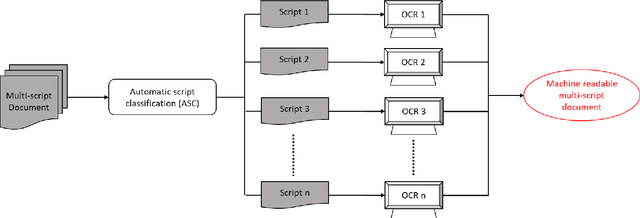
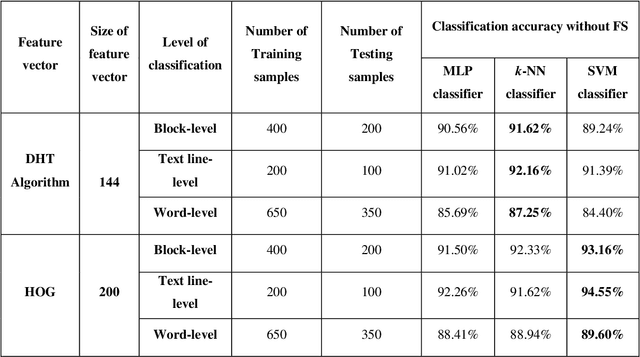
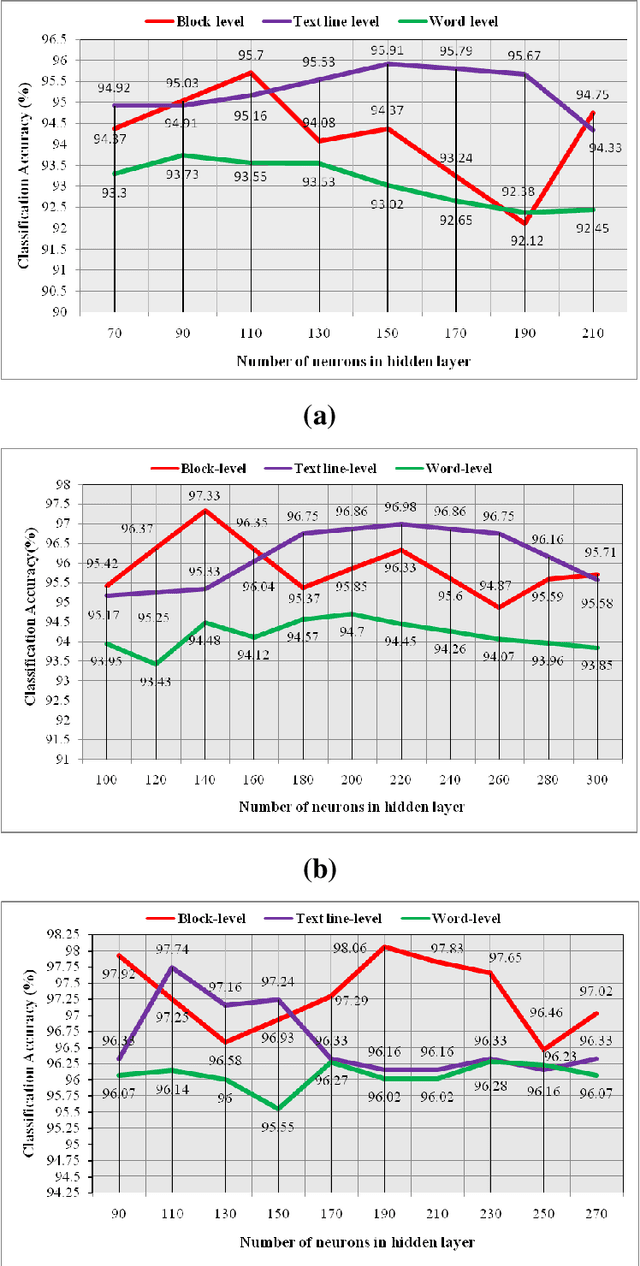

Abstract:In any multi-script environment, handwritten script classification is of paramount importance before the document images are fed to their respective Optical Character Recognition (OCR) engines. Over the years, this complex pattern classification problem has been solved by researchers proposing various feature vectors mostly having large dimension, thereby increasing the computation complexity of the whole classification model. Feature Selection (FS) can serve as an intermediate step to reduce the size of the feature vectors by restricting them only to the essential and relevant features. In our paper, we have addressed this issue by introducing a new FS algorithm, called Hybrid Swarm and Gravitation based FS (HSGFS). This algorithm is made to run on 3 feature vectors introduced in the literature recently - Distance-Hough Transform (DHT), Histogram of Oriented Gradients (HOG) and Modified log-Gabor (MLG) filter Transform. Three state-of-the-art classifiers namely, Multi-Layer Perceptron (MLP), K-Nearest Neighbour (KNN) and Support Vector Machine (SVM) are used for the handwritten script classification. Handwritten datasets, prepared at block, text-line and word level, consisting of officially recognized 12 Indic scripts are used for the evaluation of our method. An average improvement in the range of 2-5 % is achieved in the classification accuracies by utilizing only about 75-80 % of the original feature vectors on all three datasets. The proposed methodology also shows better performance when compared to some popularly used FS models.
Embedded Chaotic Whale Survival Algorithm for Filter-Wrapper Feature Selection
May 10, 2020



Abstract:Classification accuracy provided by a machine learning model depends a lot on the feature set used in the learning process. Feature Selection (FS) is an important and challenging pre-processing technique which helps to identify only the relevant features from a dataset thereby reducing the feature dimension as well as improving the classification accuracy at the same time. The binary version of Whale Optimization Algorithm (WOA) is a popular FS technique which is inspired from the foraging behavior of humpback whales. In this paper, an embedded version of WOA called Embedded Chaotic Whale Survival Algorithm (ECWSA) has been proposed which uses its wrapper process to achieve high classification accuracy and a filter approach to further refine the selected subset with low computation cost. Chaos has been introduced in the ECWSA to guide selection of the type of movement followed by the whales while searching for prey. A fitness-dependent death mechanism has also been introduced in the system of whales which is inspired from the real-life scenario in which whales die if they are unable to catch their prey. The proposed method has been evaluated on 18 well-known UCI datasets and compared with its predecessors as well as some other popular FS methods.
 Add to Chrome
Add to Chrome Add to Firefox
Add to Firefox Add to Edge
Add to Edge